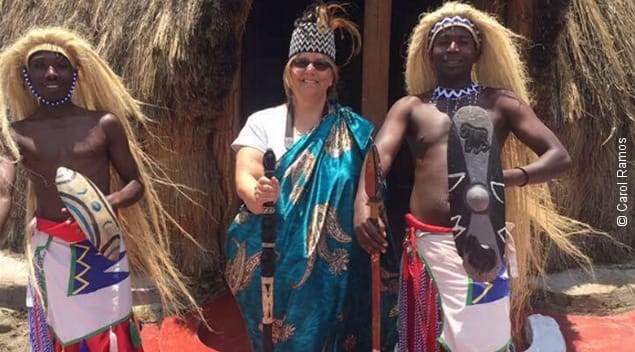Top style tips for Uganda
- Ugandans are very relaxed and most types of clothing are acceptable. We suggest you pack for comfort rather than fashion.
- In Kampala and most of the bigger cities Western clothes such as jeans and t-shirts are fine.
- Outside of major cities we suggest that you dress more conservatively.
- During the day it is hot so our advice is to pack lightweight layers in natural fabrics such as linen, bamboo and cotton.
- Wear plenty of sunscreen (we love the Riemann P20 range for 10 hour protection), sunglasses and a sunhat.
- However it does cool off at night so pack a fleece or jumper too.
- We suggest keeping to light, neutral colours; khaki, green and brown, but not white as it will get dirty and dusty very quickly.
- Avoid blue or black clothing – the tsetse flies are drawn to these colours, and their bite can give you African Sleeping Sickness.
- Long trousers and long-sleeved tops will protect you from the harsh sun and protect against mosquitoes at night. But don't forget your insect/mosquito repellent too.
- Pack light, and include some soap for hand laundry – it's very quick to dry clothes outside on a bush as the locals do. Spare t-shirts are very cheap to buy too if you need one.
- It would be a good idea to pack a lightweight and versatile travel jacket. We like the SCOTTeVEST range because they have been specifically designed with travel in mind, offer plenty of storage pockets and have awesome additional features like RFID security and Personal Area Network connectivity.
Shoes to pack for Uganda
- Comfortable walking shoes or sandals are important as the roads are dusty and uneven. Try Hotter shoes, they are amazingly light and comfortable.
- For walking in the bush, lightweight walking shoes or trainers are fine. It is not always smooth and even, so anything that minimises the chance of a twisted ankle is a good idea.
- Pack good boots for forest trekking.
Clothing Tips for Women
- Casual, comfortable clothes are the key. Dress down rather than up here. Short, tight or revealing clothes should be avoided.
- And our advice would be to avoid wearing shorts – most Ugandan women would not wear these; they wear skirts or dresses that usually cover the knees.
- A long skirt or loose-fitting trousers are good in the heat and will protect you from the sun.
- Leave your valuables and jewellery at home, you really won't need them.
- A pashmina or sarong is a versatile item that you can use for sun protection or to ‘glam' up the simplest of outfits if you feel like a change.
Clothing Tips for Men
- There are no specific things to bring to your attention, check out our packing list for our suggested capsule wardrobe.
Regions of Uganda
- If you are visiting the mountains it will be cooler at altitude so pack warmer layers and a waterproof jacket. light wool is a good choice to wear against your skin as it naturally helps to regulate your body temperature. It keeps you warm in the cold, wicks away moisture when it's hot, and doesn't retain odours – even after prolonged wear.
- On safari the idea is to relax and enjoy your time under the African sky, and listen to the calls of the wild all around you. Dinner dress is therefore casual and comfortable.
- When trekking in the forests, in search of chimpanzees perhaps, cover up as much as possible to protect yourself from both prickly brambles and insects. It is humid so choose light, natural fabrics, but wear long sleeves and trousers, plus longer socks which you can pull over your trousers to stop the fire ants getting in. Protective gloves (e.g. garden gloves), a light raincoast and good boots are recommended too.
Travel essentials for Uganda
- For the best rates, only take large currency notes (e.g. $100) to exchange – you will lose out if trying to change smaller amounts.
- Pack a sling bag or lightweight day sack for sightseeing trips, game drives and forest treks; you'll need to take plenty of water.
- But don’t drink or even brush your teeth in tap water. Consider taking a LifeStraw Filtration Water Bottle instead.
- Hair conditioner is difficult to find, so if it's essential for you don't forget to pack your own.
- A soft-sided rucksack is more practical than a hard suitcase for safari and trekking holidays – it's easier to fit into the small planes or transfer vehicles. Using packing cubes can help to keep your belongings tidy whilst compressing the volume too.
- Internal flights often have much lower baggage limits than your international carrier. Use an accurate luggage scale to ensure you keep within the weight allowance.
- Look after your mobile phone with a phone bunjee – it protects against loss, theft and damage. You may like to carry a solar powered charger too, to boost your battery when out and about – you don't want to miss that great photo opportunity!
- To use electrical gadgets you may need a travel adapter plug, and also a step down voltage converter if your devices are not designed for the local voltage (240V).
- Avoid paying unexpected baggage fees – use an accurate luggage scale to ensure you keep within the weight allowance. Don't forget to leave room for souvenirs on the way home! Trinkets featuring the endangered mountain gorillas are aplenty and would make a typical Ugandan keepsake. Or why not have a shirt hand-made for you in the local markets. Try to buy from small shops and street vendors – they will really appreciate your custom.

